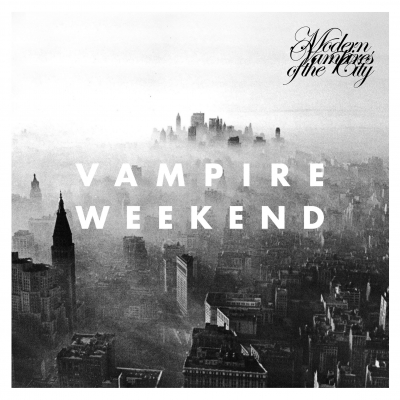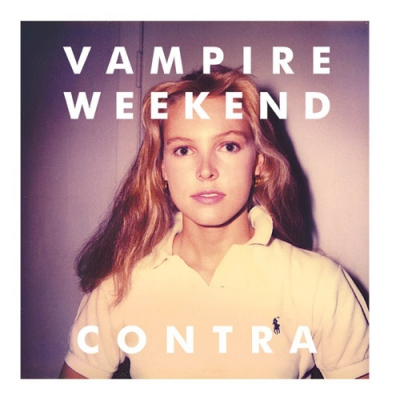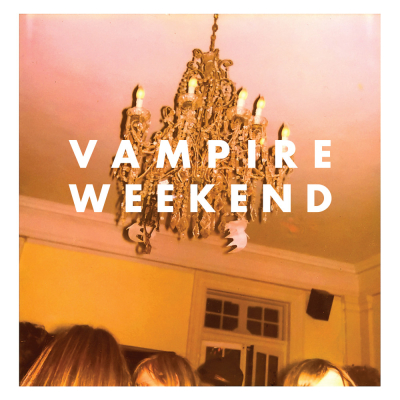Vampire Weekend
Some bands stay in a holding pattern their whole careers. Others jerk the steering wheel hard and fly off the road. On their second album, Vampire Weekend do neither. Or maybe they do both. “I think we sound more like Vampire Weekend than we did on the first record,” says drummer Christopher Tomson.
Contra pulls off a series of impressive feats: It’s bustling with fresh ideas, and yet it sounds immediately familiar; it’s heavily layered but taut and kinetic; it chews ravenously through sound palettes and rhythms, and yet it’s nimble and assured; it’s still breezy, and yet it smolders with a newfound emotional heft. “It’s sadder than the first one, a bit more sentimental,” says singer Ezra Koenig. The songs are catchy, fast, twinkling, clattering – the darker themes of loss, doubt and regret accumulate almost imperceptibly, but they land a powerful blow.
Ideas for this record had been bubbling since before the release of their debut. The band started recording in January 2009, only two weeks after finishing an 18-month world tour supporting their first record. They had initially planned to work in California, feeling that the new record’s spiritual home was the West Coast. The decision to work in New York, however, ultimately provided the freedom and perspective to properly realize their vision.
That March, the band toured Mexico for the first time. They recorded new material blocks away from Frida Kahlo’s house in the Coyoacán neighborhood of Mexico City. In Monterrey they found a kindred spirit in DJ/Producer Toy Selectah, exchanging ideas and philosophies over days spent listening to records in his home studio. They returned to New York energized.
The finished product explodes any reductive notions of what constitutes Vampire Weekend’s sound and aesthetic. The varied influences here include third-wave ska, the Hallelujah Chicken Run Band, Brazilian baile funk, Congolese thumb pianos, Repo Man, Sublime’s 40 Oz. to Freedom, reggaeton, bachata, Bollywood, Philip Roth, Beethoven, NYC 1983, dancehall, and the Beastie Boys’ second album, Paul’s Boutique.
All of these influences are incorporated with subtlety and sophistication, woven together into a seamless fabric of references that, heard in full, resembles nothing so much as itself. Vampire Weekend’s music and lyrics serve to both construct and deconstruct a world around them. Like the word “contra” itself, the songs are layered with meaning and invite interpretation. With this album, Vampire Weekend have staked out an alien territory – literate, crackling, alive – that’s unmistakably their own.
Contra pulls off a series of impressive feats: It’s bustling with fresh ideas, and yet it sounds immediately familiar; it’s heavily layered but taut and kinetic; it chews ravenously through sound palettes and rhythms, and yet it’s nimble and assured; it’s still breezy, and yet it smolders with a newfound emotional heft. “It’s sadder than the first one, a bit more sentimental,” says singer Ezra Koenig. The songs are catchy, fast, twinkling, clattering – the darker themes of loss, doubt and regret accumulate almost imperceptibly, but they land a powerful blow.
Ideas for this record had been bubbling since before the release of their debut. The band started recording in January 2009, only two weeks after finishing an 18-month world tour supporting their first record. They had initially planned to work in California, feeling that the new record’s spiritual home was the West Coast. The decision to work in New York, however, ultimately provided the freedom and perspective to properly realize their vision.
That March, the band toured Mexico for the first time. They recorded new material blocks away from Frida Kahlo’s house in the Coyoacán neighborhood of Mexico City. In Monterrey they found a kindred spirit in DJ/Producer Toy Selectah, exchanging ideas and philosophies over days spent listening to records in his home studio. They returned to New York energized.
The finished product explodes any reductive notions of what constitutes Vampire Weekend’s sound and aesthetic. The varied influences here include third-wave ska, the Hallelujah Chicken Run Band, Brazilian baile funk, Congolese thumb pianos, Repo Man, Sublime’s 40 Oz. to Freedom, reggaeton, bachata, Bollywood, Philip Roth, Beethoven, NYC 1983, dancehall, and the Beastie Boys’ second album, Paul’s Boutique.
All of these influences are incorporated with subtlety and sophistication, woven together into a seamless fabric of references that, heard in full, resembles nothing so much as itself. Vampire Weekend’s music and lyrics serve to both construct and deconstruct a world around them. Like the word “contra” itself, the songs are layered with meaning and invite interpretation. With this album, Vampire Weekend have staked out an alien territory – literate, crackling, alive – that’s unmistakably their own.



